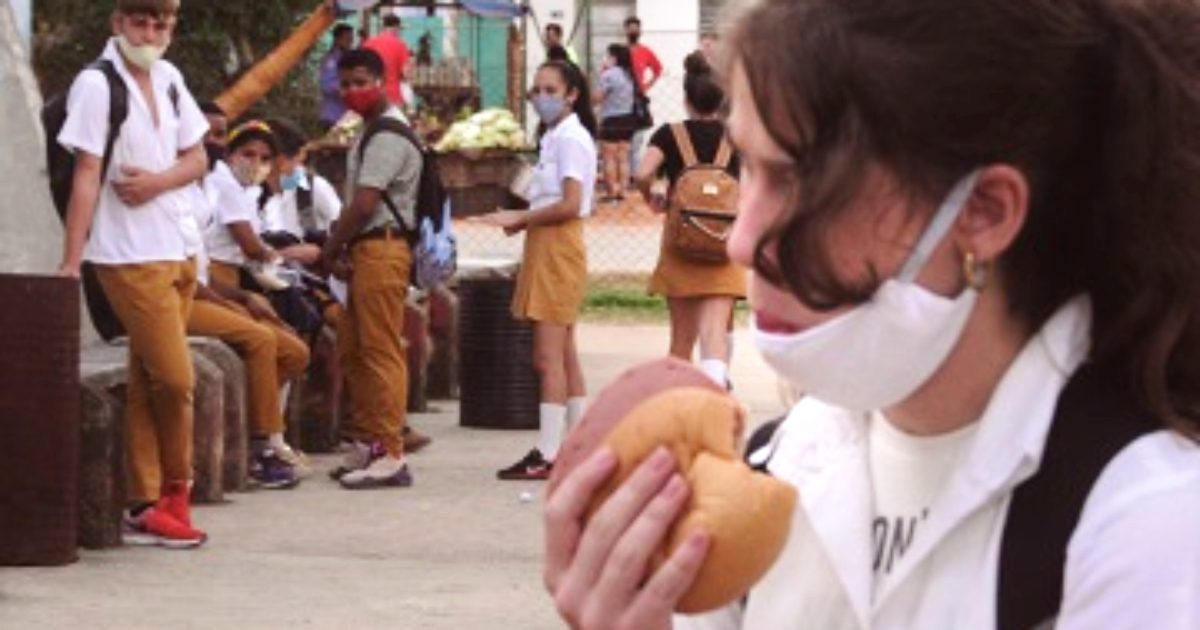
In their efforts to combat the resale of school snacks among students, the authorities of the province of Santiago de Cuba implemented an unusual measure that has sparked controversy and concern among parents and educators.
Now, Basic Secondary students must take a bite of their snack before leaving the classroom, an action supervised by the teaching staff of each institution and which is included on its own right among the major misguided policies of the Cuban authorities to address food shortages, inflation, and other symptoms of a widespread crisis threatening large segments of the population at risk of food insecurity.
This "solution", revealed by the independent outlet Diario de Cuba, aims to curb the widespread practice of selling bread, an activity that Santiago students have adopted to cope with shortages and improve their economic situation, sometimes carried out in complicity with teachers, which is further evidence of the degeneration of the educational system in Cuba.
The resale of school snacks is a reflection of food insecurity and the loss of purchasing power affecting Cuban families. Many students resort to selling their bread and drinks to earn money, which they then use to cover various needs, from transportation and hygiene items to entertainment and providing economic support to their relatives.
This practice, although widespread, is seen by many as unhygienic and harmful to students' health. However, students perceive it as an opportunity to earn income which they use to meet their needs or contribute to their families' precarious economies.
Lisandra Ordoñez, a student at Rubén Bravo secondary school, told the aforementioned media how she and her classmates started selling bread in October of last year. "First, we did it with our closest friends, then with the whole group. Every day one of us alone receives the income from the sales," she said.
For some students, like Liena Peñalver, this sale allows them to purchase basic products such as shampoo and personal hygiene items, while others, like Elder Toledano, use the money for transportation and recreational activities.
Mixed opinions among parents
The measure has been met with skepticism and discontent by parents, who consider that it forces students to behave in an unusual way.
Lidia Pacheco, mother of two teenagers, criticized the measure, stating that "it attacks the consequences and not the causes of a problem created by the economic collapse and the worsening of poverty." Other parents, like Odalis, describe it as "absurd and counterproductive."
Dr. Rafael, who has a son in this educational system, pointed out that "the damage caused by nutrient deficits in young people whose parents lack the money to provide them with a proper diet has multiple consequences for their future." He argued that obligating teenagers to eat a snack does not solve the underlying problem.
Since last year, the quality of the school snack has significantly decreased. Nilsa, another student, explained to the aforementioned media outlet that the snack arrives late and that the bread no longer includes any side dish, making it unappetizing.
The lack of nutritious food in school snacks has worsened due to the shortage of flour and the food crisis on the Island, forcing many students to leave their homes with barely a bite to eat.
In 2002, a policy was implemented in secondary education that aimed to ensure adequate food conditions so that adolescents could stay in school throughout the day.
However, the current crisis has dismantled these purposes. The school snack, which should cover 30% of the students' daily nutritional needs, has been reduced to a simple bread with water, without any significant nutritional value.
Requiring students to bite into bread to prevent its resale has highlighted the severity of the economic and food crisis in Cuba. While students seek ways to alleviate their basic needs and help their families, the imposed solutions seem not to address the root of the problem.
What do you think?
COMMENTFiled under: